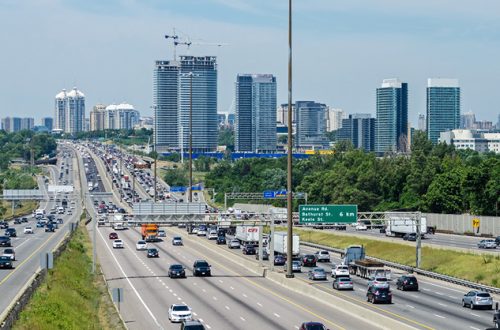This blog was contribute by: Tiffany Joseph, EIT, Diversity and Inclusion Task Force, Member
Shivani Nathoo, EIT, Diversity and Inclusion Task Force, Member
Réjeanne Aimey, P.Eng., Ontario Society of Professional Engineers, President
It is no secret that engineering is a demanding profession. We must learn all we can about mathematics and science, along with the ins and outs of our specific disciplines, all while understanding how to protect the public interest and the environment. Engineering students have close to the highest number of classroom hours per week when compared to other undergraduate university programs. On top of that, much study and assigned work is done outside of those classroom hours.
As we endeavor to make the world a better place professionally, engineering graduates and engineers continue to meet demands while toiling away to ensure the best work is always produced; this often requires more than the 40-hour average work week. Surviving this right of passage to become an experienced professional engineer is a great source of pride for engineering students, graduates, and professionals and has led to the popular catch phrase “ERTW”: Engineers Rule the World.
Due to the rigors of an engineering program, it seems that only those of strong mind and will are resilient enough to move beyond the first year and eventually graduate. In fact, many of the more established engineers cannot recall any engineering students or graduates who suffered openly with mental health concerns during their time—though we acknowledge that many could have suffered in silence. Today, on World Mental Health day, we reflect on this.
As the world has become more empathetic the mental health narrative has entered the mainstream like it never has before. In the past, many potential engineering graduates could have been lost due to their inability to overcome the poor mental health habits cultivated by our profession, rather than being unable to keep up with intellectual rigor. The bar was set very high, and if you did not get the grades, you were told that you simply were not good enough. Because engineering is known to be “hard,” we were conditioned to accept a heavy mental load while we ignored any potential consequences.
As Tiffany Joseph, EIT, explains “Since I joined my engineering program, poor mental health has been a marker of hard work and success. If you were not sacrificing your free time to study or burning the candle at both ends to meet ever-increasing demands for work, you were falling behind. And if you were falling behind, you were not going to graduate. And on it goes.”
Pandemics and the ensuing chaos are exacerbating society’s collective stress, anxiety, and creativity, and the uncertainty of outcomes can result in difficulty coping—even for the strongest of minds. Times like these highlight potential areas of growth for our profession by shining the spotlight on the need for support structures and resources available to the “strong” as we cope with pandemic restrictions.
As we see Covid-19 cases rising in Ontario, it is increasingly important that mental health is considered while isolated and working from home, balancing work, taking care of family members, and assisting with children’s schooling. It is extremely important that we consider the different ways in which employees face challenges, as many people (especially women) are considering leaving the workforce due to burnout, mental health issues, and the increasing demands on mothers.
How do we overcome this mental health and wellness challenge? The Canadian Mental Health association provides a tool that we can all assess our mental health: https://cmha.ca/mental-health-meter. As engineers, we can use this time to create order out of disorder by dedicating time to upgrade our skills in our areas of expertise or by learning something new through resources available to us via our professional networks and professional associations. Making time to connect with your co-workers and close friends on a regular basis to maintain connections to the things that you love, making time to exercise daily, and connecting with nature by going for a walk in your neighbourhood could all have a positive impact on our mental health.
OSPE’s Diversity and Inclusion Taskforce have determined that now, more than ever, we must provide ways for engineers and engineering graduates to seek help, receive support, and take care of themselves and their families. We are considering how best to support the engineering community, by potentially providing resources for employers of engineers and engineering graduates on how to recognize and respond to signs of distress while supporting all employees; including those on extended leave with return-to-work plans to ease their transition.
Most importantly, due to the isolation created by COVID-19, we want to create awareness and a space for members of the engineering community to come together to discuss these challenges openly. As a start, we partnered with the Ontario Engineering Academy (OEA) to host a virtual webinar on How to Optimize Wellbeing during Adversity on June 4, 2020. This session discussed how adversity relates to wellbeing, and what we can do to ensure that we can stay ahead of challenges to it. The session presented fundamental principles, tools and strategies that improve and safeguard wellbeing. These include mastering mindset & emotions; making peace with where you are; self-awareness; self-care; and creating and maintaining positive relationships.
It is important that government takes action to support its citizens as support for mental health and wellbeing does not start and stop at a particular workplace. We would like to commend the Ontario government for expanding virtual mental-health services during COVID-19. As part of the government’s $12 million commitment to mental health during COVID-19, the emergency funding has helped mental health agencies hire and train more staff, purchase the necessary equipment and technology they need to help patients, and support the creation and enhancement of virtual and online supports for mental health services including:
- Internet-based Cognitive Behavioural Therapy (iCBT): Clients can self-refer to programs through the various service providers listed and be guided through their client journey to find the appropriate supports they need. Online iCBT is supported by therapists and available in English and French.
- Virtual mental health support services: These include BounceBack telephone coaching and workbooks, and Kids Help Phone for children and youth.
Many people believe that the pandemic was a catalyst for change; that we should recognize how our lifestyles and careers are being shaped around focal points of mental health triggers.





Comments (2)
And who – if anybody – is looking at the mental health issues for foreign trained engineers constantly barred from working because of the idiotic and self-perpetuating phenomenon involving the “excuse” for refusing to hire them based on so-called “lack of Canadian experience” ? The whole approach in Canada towards people out of work / unable to get work / is so amateurish, incompetent and unprofessional as to be almost beyond belief. I’ll have more to say later about the associated behaviours by everybody involved in creating and sustaining this mess and Canada’s STUPIDITY INDUSTRY.
With reference to what I said here earlier today, (currently being moderated?), I thought the OSPE EDIAdvantage conference on Nov. 26th and 27th was extremely good and was/is a very important step along the road to solving the problems that we all face. I found myself agreeing with everything that all the presenters said. What I said earlier in no way alters or contradicts anything that the presenters said, and vice versa. Instead, what I said earlier represented additional dimensions to the subject matter of the conference which have persisted with evading everybody’s attention over the years and decades. They need the same attention as the subject matter of the conference, otherwise we will never have complete solutions to the overall set of problems.
Leave a Comment